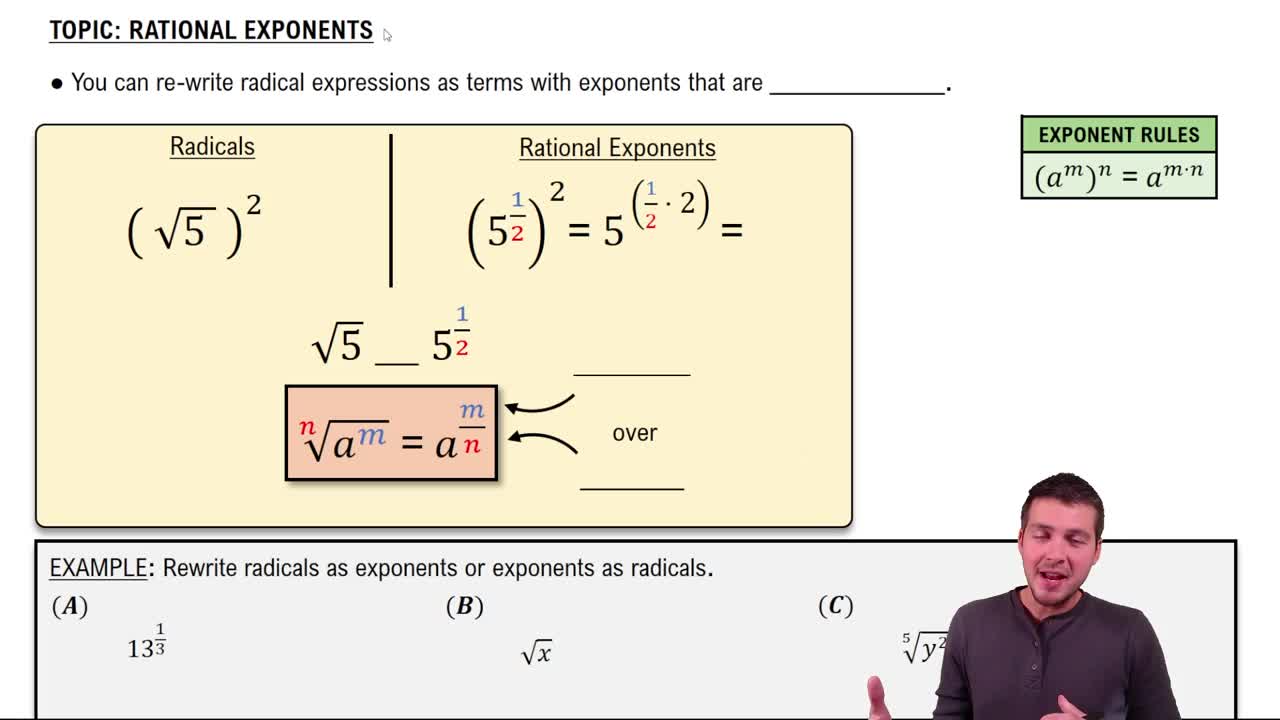Table of contents
- 0. Review of Algebra4h 16m
- 1. Equations & Inequalities3h 18m
- 2. Graphs of Equations43m
- 3. Functions2h 17m
- 4. Polynomial Functions1h 44m
- 5. Rational Functions1h 23m
- 6. Exponential & Logarithmic Functions2h 28m
- 7. Systems of Equations & Matrices4h 6m
- 8. Conic Sections2h 23m
- 9. Sequences, Series, & Induction1h 19m
- 10. Combinatorics & Probability1h 45m
0. Review of Algebra
Radical Expressions
Problem 1b
Textbook Question
Write ∛64 using exponents and evaluate.
 Verified step by step guidance
Verified step by step guidance1
Recognize that the cube root of a number can be expressed as an exponent: \( \sqrt[3]{64} = 64^{1/3} \).
Identify that 64 is a power of 2: \( 64 = 2^6 \).
Substitute \( 64 \) with \( 2^6 \) in the expression: \( (2^6)^{1/3} \).
Apply the power of a power property of exponents: \( (a^m)^n = a^{m \cdot n} \).
Calculate the new exponent: \( 2^{6 \cdot (1/3)} = 2^2 \).
Recommended similar problem, with video answer:
 Verified Solution
Verified SolutionThis video solution was recommended by our tutors as helpful for the problem above
Video duration:
4mPlay a video:
Was this helpful?
Key Concepts
Here are the essential concepts you must grasp in order to answer the question correctly.
Radicals and Exponents
Radicals are expressions that involve roots, such as square roots or cube roots. The cube root of a number 'a' is expressed as ∛a, which is equivalent to a raised to the power of 1/3. Understanding the relationship between radicals and exponents is crucial for manipulating and evaluating expressions involving roots.
Recommended video:
Guided course

Rational Exponents
Evaluating Cube Roots
To evaluate a cube root, you need to find a number that, when multiplied by itself three times, equals the original number. For example, ∛64 asks for a number that satisfies x³ = 64. Recognizing that 4 × 4 × 4 = 64 allows us to conclude that ∛64 = 4.
Recommended video:

Imaginary Roots with the Square Root Property
Properties of Exponents
Properties of exponents, such as the product of powers and power of a power, help simplify expressions involving exponents. When rewriting radicals as exponents, these properties can be applied to combine or simplify terms. For instance, knowing that a^(m/n) = ∛(a^m) can facilitate the evaluation of expressions like ∛64.
Recommended video:
Guided course

Rational Exponents
Related Videos
Related Practice













